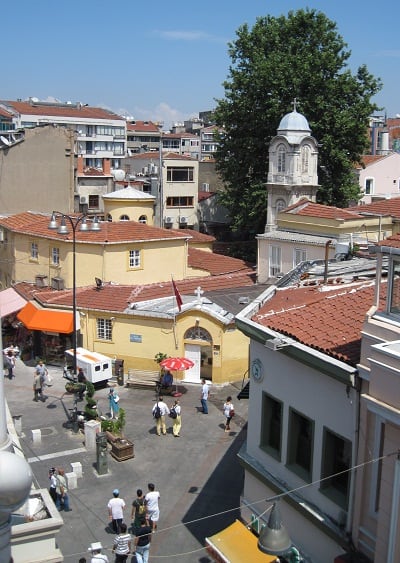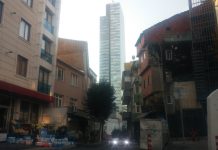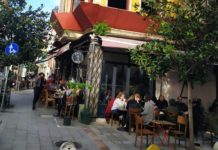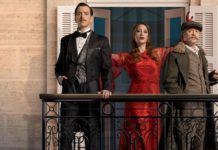
I live in Kadıköy, the “city of the blind.”
Have you heard this one?
Well, in ancient times, the first Greeks who arrived from Megara set up residence here on the Asian side of the city and called the area Chalcedon (“Khalkedon” in Turkish). According to lore, these Greeks had been instructed by the Oracle of Apollo to construct a great city “opposite the city of the blind.” (On a side note: How about that for a visual reference, eh? “Yeah, just keep going until you see a bunch of people walking around with sticks and guide dogs, then just go opposite.”)
But anyway – hence, the settlement in Chalcedon.
Later, when others arrived to establish Byzantium, the site at Chalcedon was viewed as so obviously inferior to the European side across the Bosphorous, that it was said the original Greek founders at Chalcedon must have been blind.
I can just imagine the ancient dialogue:
“We were sent by the oracle to build a great city,” says an old Chalcedonian, sitting under a tree in Moda and looking contentedly out at the Sea of Marmara.
“And you settled here? And not over there?” enquires a new arrival, pointing across the rolling waters of the Bosphorous to what would become Galata. “What, man – are you fuckin’ blind?”
The old Chalcedonian, who may well have been Homer Simpson’s ancestor, suddenly recalls the Oracle, and has a a horrible ephiphany:
“Doh!” he exclaims, slapping his head. He wrings his toga in despair, plucks his eyes out and plunges unhappily into the sea.
“Well, that was awkward,” says the new arrival, who then sets off for the European side.
Of course, we all know that a great city eventually was established. Initially, Chalcedon was outside the city walls and therefore unprotected. But in time it came under the under the jurisdiction of Constantinople. The name of the district was changed to “Kadıköy,” meaning “the village of the judge.”
****
I’ve heard this tale of Kadıköy’s origins before, from students mostly. I even looked it up on the Internet and found versions of it. So there must be at least some truth to it.
I’m a Kadıköy resident myself, as I said. I’ve made my home here ever since I arrived in Istanbul some five years ago.
Well, to be honest: I think the poor Chalcedonians got a bad rap. After all, back in 685 BCE, surely there were not the endless shopping centers and maze of traffic that characterize much of the Asian side today. Actually, it must have been equally beautiful on the Asian side, with its wide access to the Sea of Marmara as well as the Bosphorous.
And also, just up until about the 1970s, Kadıköy was a place where Istanbullus built their summer houses and went for their holidays.
Plus, it’s not as if the original Greek settlers were that far off; it’s not as if they settled in what is now the factory-and-warehouse wastelands of Gebze (in which case, I would agree that they would have almost certainly been blind, if not insane!)
Yes, those old Chalcedonians (I call them this for a convenient tag) could have done far worse than Kadıköy. And maybe the Oracle of Apollo had a hidden message – you never can trust these damn oracles, after all: Just ask Oedipus. Or that poor king of the island of Thera, who according to lore went to Delphi to offer a gift and was told by the oracle that he would “found a city in Libya.” The problem was, the poor king had no idea where Libya was! Trust our friend, the oracle, to really set you on your way.
So maybe in this case, the oracle’s message was meant as a trick, a diversionary tactic in order to preserve the area on the Asian side, and let all the riff-raff, the social climbers, the conquerors – in short, the assholes, go over to the European side (No offense to people living there now, we’re just speculating on antiquity, after all).
It helps keep the real estate prices down, and in the evenings when you go out for a drink you can always get a table. The waiter always remembers your name (“Demetrius! How the hell are you, you old snake in the grass? Will it be the usual?”)
As you can see, there are certain overlooked benefits of misinterpreting an oracle. And who needs oracles anyway? They usually just cause trouble, as we see in all those ancient wars.
And even when the oracle comes straight out and tells you, it doesn’t seem to be of much use.
Consider the fate of poor Lysander, the Spartan victor of the Peloponnesian War. He was told to beware:
Also the dragon (serpent), earthborn, in craftiness coming behind thee.
Wouldn’t you know it? A few years later, Lysander was slain from behind by a guy who had a serpent on his shield.
Lysander’s fate calls to mind the words of the great Dennis Leary, who may have addressed the subject of oracles once and for all when he said:
“Lou Gehrig – he died of Lou Gehrig’s Disease. Damn, you’d think he would’ve seen that one coming!”
****
No, in Kadıköy these days, we don’t follow oracles. We’re too busy for that. It’s a great place to live though, with its easy access to the Bosphorous, as well as the tree-lined parks in Moda. There are the fish markets, cafes and bars, and as the poet Nazım Hikmet once wrote, “the most beautiful women live in Kadıköy.”
So again, I’ll take the side of those original Chalcedonians – who were probably the first Fenerbahce fans (they had blue and gold tunics, I’ll bet). They knew enough not to put too much stock in oracles, and that if anybody is blind, it was probably the ones who settled on the other side of the Bosphorous.
James Tressler is the author of “Conversations in Prague,” and “The Trumpet Fisherman and Other Istanbul Sketches.” He lives in Chalcedon.
What are Letters from Istanbul?
Istanbul is a million villages woven, one might even say, thrown together, rather than a single vast city. The city is best understood by understanding little bits at a time, one person at a time. It is a city that defies perspective, for it is constantly shifting. It is an endless parade of street musicians playing simple, overlapping melodies, rather than a symphony orchestra striking a single majestic chord; it is an intricate mosaic rather than a grand oil portrait, the pieces of the mosaic each giving meaning and sustenance to the whole.
All that sounds a bit high-flown, I know. But to paraphrase James Joyce, the universal lies within the particular. So, that’s the intent of these Letters: to gather up those mosaic tiles one at a time, and to find the little stories that fall between the cracks. Hopefully the pieces of that mosaic will add up to an interesting portrait of this city a lot of us call home.











Is is Chalcedon or Khalkedon?
Like.
Dude, oracles are always right – the problem is that if you can’t handle the truth, you shouldn’t be asking. Boom.